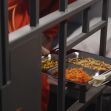William Rouser is a practicing Wiccan, or a male “witch” that, according to modern language, no longer distinguishes between males and females. He has also been an inmate at the Mule Creek State Prison in Ione, California, for 30 years. He asked the prison to provide him with candles, incense, an altar cloth, and an open pit with a flame so he could perform his religious rituals. The prison denied his request. Then he requested and received a consent decree from the California Department of Corrections in 2011, which the prison refused to honor. The District Court for the Central District of California denied him an injunction and the Ninth Circuit, in a 2-1 decision, affirmed the denial.
Rouser argued that his consent decree allows him and his fellow Wiccan prisoners to conduct eight annual “sabbats” in an outdoor area where participants have access to a fire pit that is part of the “outdoor worship area.” When the prison denied him access, Rouser filed a request for a preliminary injunction to Presiding District Judge R. Gary Klausner. Klausner denied the injunction, saying that although the consent decree allows him “access” (italics in original) to the fire pit and the other materials needed for worship, “the use of those objects are expressly limited by ‘institutional safety and security concerns, including applicable fire safety regulations.”
Rouser appealed, relying on both the First Amendment and the Religious Land Use and Institutionalized Persons Act of 2000 (RLUIPA), which “prohibits government from imposing …(a) land use regulation… that imposes a substantial burden on the religious exercise of a person.” It exempts regulations that “further a compelling government interest.” Rouser said Klausner’s ruling abused his discretion as a judge.
Ninth Circuit Senior Justice Carlos Bea and Sixth Circuit Judge Eugene E. Siler wrote the unpublished 2-1 majority decision in a memorandum opinion on July 5, while Circuit Judge Sandra S. Ikuta dissented. The opinion begins with an explanation of the required components for an injunction due to abuse of discretion. To prevail, according to precedent, the decision must be based on “an erroneous legal standard or clearly erroneous findings of fact.” In addition, the factual finding must be “illogical or implausible,” or lacking in support for “inferences that may be drawn from the facts in the record.” The opinion also stated that a lower court’s decision could not be reversed simply because the reviewing court disagreed with it.
The Justices wrote that Klausner correctly applied the precedent of Winter v. Natural Resources Defense Council, Inc., 555 U.S. 7, 20 (2008) when it denied Rouser’s injunction. They explained that Rouser failed to establish the critical factor: a likelihood of success on the merits of his claim that alleged his consent decree was breached. They also said his RLUIPA and First Amendment claims were inadequate.
The opinion singled out Rouser’s argument that the prison’s fire safety and security policies were wrong. The justices agreed with a declaration by the prison’s Community Resource Manager (CRM) that said “… no inmate…is permitted to use fire for safety and security reasons…with one exception.” That exception was for Native American purification (sweat) ceremonies” because they are allowed to use a fire pit to heat river or lava rocks that would be used for “purification ceremonies.” The CRM stated that the Native American fires would be tended by only one inmate and used solely to heat the rocks.
During oral argument, as reported in The Metropolitan News-Enterprise, Rouser’s pro bono attorney said that the latter part of the CRM’s sentence that said “the fire pit is not used by the entire Native American congregation” is wrong because the rest of the sentence said that “at the outset of their ceremony, all participating Native Americans do gather around the fire.” The attorney accused Krausner of having “selectively quoted” what the CRM said. However, the majority of Ninth Circuit justices found that the omitted words “lack significance.”
The opinion said that Rouser’s reliance on the interpretation of a single sentence in the CRM’s declaration was wrong. Rouser interpreted this sentence to mean that the fire pit was used by the entire group of Native American worshipers. But that is not how the district court correctly interpreted it. It determined that Klausner was right when he said that “…only one Native American inmate is allowed near the fire,” and that “…the fire pit is not used by the entire Native American congregation.” This interpretation is further clarified by the CRM’s next sentence which states that Native Americans “do not use the fire pit or access open flame during their ceremonies, as the heat…is generated from the rocks which were previously heated in the fire pit.”
Rouser argued that these two sentences were hard to reconcile, but the Ninth Circuit disagreed, saying they could indeed be reconciled. He clarified that offering prayers to the fire did not mean that the whole congregation gathered around the fire. Furthermore, the opinion compared the Native American practice with a Christian one where prayers are offered to a tabernacle that does not “require the congregations to closely surround it.”
Thus, the Ninth Circuit concluded that Rouser’s interpretation of the Winter precedent did not provide a reason to accept it. The opinion added that an appellate court is not permitted to substitute its interpretation for the trial court’s “…so long as reasonable minds could differ.” When this occurs, as it does here, the opinion stated, “…we cannot say that one of those minds is clearly erroneous.” Thus, they ruled that the district court’s interpretation of the CRM’s fire and security policies was “not clearly erroneous” and based on his “permissible interpretation.”
In conclusion, the memorandum opinion ruled that Rouser failed to show that any of the district court’s findings were in error. Therefore Rouser failed to prove a likelihood of success on the merits and the district court properly acted within its discretion.
Ikuta’s dissent pointed out that Rouser has been trying to practice his Wiccan faith within the California prison system for 30 years and he did receive a consent decree in 1997, which the prison tried to overturn. She emphasized that fire is “an essential element” of his religious practice and she then interpreted the CRM’s statement to clearly mean that the entire Native American population did use the fire pit during its religious ceremonies.






